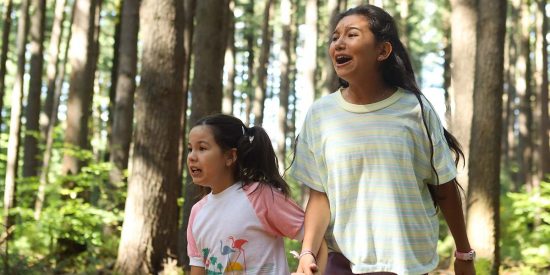TIFF 2020 Review: Beans
Coming of age tales are popular, yet common, stories on the big screen. What can often set them apart, is context and such is the case for writer-director Tracey Deer’s debut feature, Beans.
Beans (Kiawentiio) is the nickname of 12-year-old Mohawk girl Tekehentahkhwa. She is a bright, intelligent child, a good big sister, typically empathetic to those around her.he is meant to start at a private school in the fall, this summer being the last before she boards the bus to her continued education. Beans seems excited for this new chapter, but also longs to be part of the ‘cool crowd’, a group of older teenagers led by the particularly tough April (Paulina Alexis).
So far, a relatable story about a young woman trying to find her place, but this takes place in the summer of 1990 when in Quebec a golf course tried to expand right over the forest and burial grounds belonging to two Mohawk communities. Based on true events, this attempted take over of Indigenous land prompted a three-month stand-off between the Mohawk communities, the Quebec government, the police and even the Canadian Armed Forces, in what the media called the “Oka Crisis.” Now Beans’ coming of age story is rife with violence, racism, and unbridled hatred from the surrounding communities, affecting the young woman in ways that bring out both the best and worst in her.
Kiawentiio, a formidable young actress, brings to light what is clearly a very personal story from Tracey Deer. She navigates Beans’ massive character arc with expertise beyond her years. Within that arc, there are moments that many will relate to from the uncomfortable yet freeing moment of swearing for the first time to the trepidation and self doubt one feels in almost any decision at that age. But there are also moments that many of us cannot fathom, that take place amongst the protests, with Beans and her family experiencing horrendous displays of vitriol and violence that hit right to your emotional core. Beans also bears the intense pain and confusion of this targeted hatred, causing her to question everything. Using often shocking news footage from the time to anchor this story in stark reality, Deer curates a deeply emotional, compelling and distinctive cinematic work, one that can only come from experience.
I am Canadian, and was just a little younger than Beans when this horrible incident occurred. I am embarrassed to admit that I never knew about it and was, to my recollection, never taught about it. In a country that typically prides itself on acceptance and tolerance, this film serves as a fraught reminder that we are not immune, historically or presently, to the blight of systemic racism and the toll that takes. Tracey Deer elevates a common story with incredible complexity, Beans perfectly demonstrating the importance of more stories and more voices coming from Indigenous Peoples and all people of colour as a powerful lesson in perspective.











